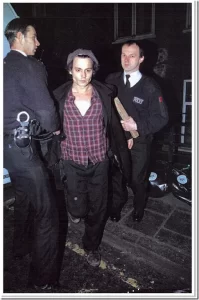The Netflix documentary reminded me of how I felt watching the Deep vs. Heard trial today.
I was highly uncomfortable.
I was not shocked by the evidence – that I was disgusted by - but by the public response to Amber Heard.
Unfortunately, it often mirrors the way the public sees domestic violence in general.
And if you ever have had some unkind thoughts about someone who claimed they were abused, read on since you might be swung by unconscious bias.

The way the public, or even close family, sometimes sees domestic violence is summarised in Mr Rottenborn, Amber Heard's lawyer closing statement:
“If you didn't take pictures, it didn't happen. If you did take pictures, they're fake.
If you didn't tell your friends, you're lying. And if you did tell your friends, they're part of the hoax.
If you didn't seek medical treatment, you weren't injured. If you did seek medical treatment, you're crazy.
If you do everything that you can to help your spouse, the person that you love, rid himself of the crushing drug and alcohol abuse that spins him into an abusive, rage-filled monster, you're a nag.
And if you finally decide that enough is enough, you've had enough of the fear, enough of the pain, and you have to leave to save yourself, you're a gold digger.
That is the message is that Mr. Depp is asking you to send. But he doesn't stop there, because in Mr. Depp's world, you don't leave Mr. Depp. And if you do, he will start a campaign of global humiliation against you, a smear campaign that lasts to this very day.
He will do everything he can to destroy your life, to destroy your career. That is what they're saying, ladies and gentlemen. And that's what they're trying to get you, the jury, to be an accomplice to. But it's not surprising because Mr. Depp cannot and will not take responsibility for his own actions. It's always someone else's fault.”
Still trying to figure out what he was talking about? So, let's dive in.

1. Messages, pictures, audio and video recordings. Many DV survivors are accused that any evidence which was recorded on the devices is fake, manipulated, or provoked. Very often, clients are asked why they took pictures or recorded conversations in the first place, with the underlying accusation that they were planning to trap a person or blackmail them. Many clients record conversations and take pictures to aid their memory and decide if they are going mad after being regularly gaslighted by an abuser, claiming that “nothing happened” or “statements were misunderstood”.
2. What friends and family knew. Many DV survivors do not tell anyone because they are afraid of being judged, people not believing them, or they still believe that they can rescue the relationship. Some clients were fearful of telling their loved ones because they were worried about their reactions, for example, family members insisting on them leaving the property or being aggressive with the violent partner. If the client proves that someone else knew about the abuse, the natural question is why the friends and family did not do anything to help or intervene.
3. Injuries. Many clients who went through the DV are also questioned about the validity of their injuries. Many times, the medical reports are undermined by questions about masochistic tendencies and the likelihood of rough sex. There is a very hurtful agreement that unless you are unconscious while admitted to the hospital, we cannot say for sure it was domestic abuse. Maybe they liked it rough.

4. But they were aggressive too. Many survivors of domestic violence are not believed because, in the process of protecting themselves or fighting back, they hurt or even killed the aggressor. One of my clients split the hand of the aggressive partner while fighting back an attack and was threatened that she would be reported as an abuser.
5. They were impossible to live with. Unless a domestic violence survivor is a saint, they cannot claim they did not provoke the abuser. All the mistakes or misunderstandings that would be discussed peacefully in a healthy relationship are scrutinised and magnified when dealing with domestic violence survivors.
6. They cannot be abusive because they are lovely. Often, the allegations are questioned because the abusers are, in general, friendly, approachable, or even charming people outside their close relationships, where they tend to be monsters.
Why do some people question the abuse or the character of a person who claimed they were abused? Well, that is a topic for another post. Would you like me to write about that? Please comment below.
